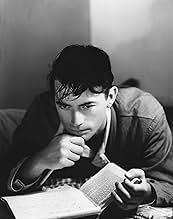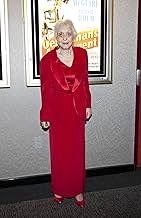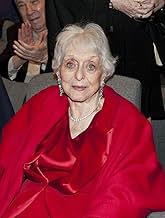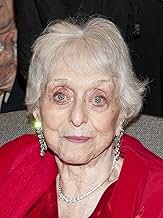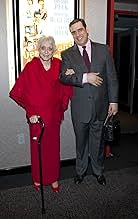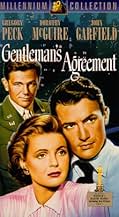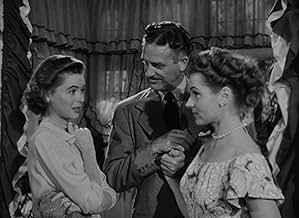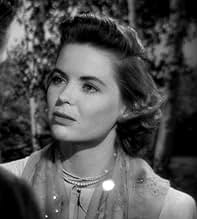Ein Reporter gibt vor, Jude zu sein, um einen Artikel über Antisemitismus zu schreiben, und erfährt dann am eigenen Leib die wahren Abgründe von Bigotterie und Hass.Ein Reporter gibt vor, Jude zu sein, um einen Artikel über Antisemitismus zu schreiben, und erfährt dann am eigenen Leib die wahren Abgründe von Bigotterie und Hass.Ein Reporter gibt vor, Jude zu sein, um einen Artikel über Antisemitismus zu schreiben, und erfährt dann am eigenen Leib die wahren Abgründe von Bigotterie und Hass.
- Regie
- Drehbuch
- Hauptbesetzung
- 3 Oscars gewonnen
- 17 Gewinne & 9 Nominierungen insgesamt
- Bill Payson
- (as Ransom M. Sherman)
- Waiter
- (Nicht genannt)
- Nightclub Patron
- (Nicht genannt)
- Mother
- (Nicht genannt)
Empfohlene Bewertungen
Elia Kazan, as I read about him in Wikipedia, has been proclaimed as an 'actor's director' for implementing his Method techniques in his film in a way that brings out the truest emotion within his actors. When Marlon Brando hails him as the best experience he has ever had with a director, it means a lot. And Gentleman's Agreement has a lot to say about the director's way of handling his actors and the subject of the film. The film seems rather like a filmed play, blackouts after every scene, unelaborated production and specific focus on actors. And the actors never sob their eyes out or scream their lungs out; their actions seem controlled and natural. There is scant music during the scenes, and therefore we never are made to feel in a particular way; everyone in the audience is entitled to feel his/her own way. And that's what made me astonished, as I was expecting high-voltage drama with the message bombarded upon the viewers. Although there were some unneeded moments, the impact that the film had on me was much more because all the actors collaborated so well without having any 'Movie Star' moment.
The matter is contentious and provocative – in the 40s; a reporter pretends to be a Jew for an article to directly be able to understand their feelings and presence in the white Christian dominated society. He is supported wholeheartedly by his openhearted mother and precocious son while equivocally by his fiancé. His decision leads to many confrontations, though most are not very serious, and a newfound friendship. The film distinguishes the varying attitudes of people – some take the initiative for the better, some for the worse while most sit on the fence. Here, Gregory, as Schuyler Green has been assigned to cover about anti-Semitism, which at that time was widely prevalent. He remains indecisive for a while but with the support of his family goes ahead and hits upon the idea of going undercover as a Jew. Gregory portrays him with immaculate sincerity though his character could have been written in a cleaner and riskier way. By this I mean his character does not experience to a fuller extent the discriminations among Jews because the radius his character chooses is limited to the upper caste society which remains more discreet in conveying its feelings. Also, there was abundant focus on his relationship with Kathy, his fiancée which although was very interesting as it gave focus to her own views on racism, but it neglected his interactions with other people. Yet, to take up this matter in the 40s is very brave.
Some viewers on IMDb denounce Kathy for being shallow, but I have to say that most people even today are like her in some or the other way. We know that something is wrong yet we sit and do nothing. And Dorothy McGuire channels this feeling of 'shame of not doing something' to a tee. And regarding certain viewers' complaint regarding the ending of the film, I say that basic human feelings such as love should not alter because of one incompatibility. I shall give a personal example here: My grandmother is staunchly against a leader's administration and is quite vocal about it but she would always reprimand my grandfather whenever he would provide criticism about the reader in the newspaper. That does not mean my grandpa will divorce my grandma and go soul searching; I was not disappointed by Schuyler's decision in the end.
The supporting cast act like pillars in the film, with not one misstep from the actors. Celeste Holm is simply amazing as the feisty fashion editor who believes in equality. And I felt she really had her feet on the ground, unlike fireball Bette Davis in All about Eve, whose character too has the similar zest but seems to spit ember and heat up all the scenes. Celeste is fun, over-the-top and believable, she also wonderfully acts especially in her final scene. Anne Revere is equally brilliant, and John Garfield and June Havoc give their best in their short roles. Garfield surprisingly didn't receive supporting actor nomination, since he has some climatic scenes and dialogs. And what conviction does the young Dean Stockwell display!
The ensemble is one of the best I have seen, and under Elia's guidance, deliver their best and most genuine. It may get dreary for those expecting swelling music and over-the-top moments but anyone who can notice the director's courage for making this shall be greatly impressed.
My Rating: 9 out of 10
During the course of the film names like Gerald L.K. Smith, Theodore G. Bilbo, and John E. Rankin are mentioned. The first was a Protestant evangelical minister who started out with Huey Long, but then developed a line of anti-Semitism in his sermons. He had a considerably large following back in the day though the Holocaust did a lot in killing his recruiting. Theodore G. Bilbo and John E. Rankin were a couple of Mississippi politicians who for their redneck constituency successfully linked anti-Semitism and racism. They didn't like foreign born either and used a whole lot of ethnic slurs.
But the anti-Semitism that Gregory Peck takes on is not that of Bilbo, Smith, and Rankin. It's the genteel country club anti-Semitism that manifests itself in restricted resorts, quotas as to how many Jews will some white shoe law firm accept if any, discrimination in hiring practices, unspoken covenants {gentlemen's agreements} not to sell to Jews in certain areas; all these we see in Gentlemen's Agreement.
Peck is given an assignment to write about it and he hits on a novel approach. Just being hired by publisher Albert Dekker, he gets Dekker's backing when he says he will pretend he's Jewish and see how he's being treated. He gets quite an experience in the bargain.
Running parallel to Peck's masquerade is his courtship of Dorothy McGuire. She's a divorcée, he's a widower with a young son. The whole thing puts a strain on their relationship, especially in dealing with her sister, Jane Wyatt who lives in one of those restricted by Gentlemen's Agreement communities.
Gentlemen's Agreement came up with several nominations and three Oscars for Best Picture, Best Director to Elia Kazan, and Best Supporting Actress to Celeste Holm as a tart tongued fashion writer at Peck's magazine who proves to be a friend. Peck himself was nominated for Best Actor, but lost to Ronald Colman for A Double Life. Holm also beat out Anne Revere nominated for the same film, probably helped by the fact that Revere had won a few years earlier for National Velvet.
John Garfield who was Jewish took a small supporting role in the film as Peck's long time childhood friend who educates Peck into how a Jew deals with the rebuffs he's finding out about. Had he not been up also for Body and Soul as Best Actor, he might well have earned a Supporting Actor nomination here.
Also note Sam Jaffe as the fictional professor Lieberman which is a thinly veiled caricature of Albert Einstein probably the most noted figure in the world of Jewish background. Like Lieberman, Einstein's a cultural Jew, not religious in any sense of the word. Nevertheless he was a leading figure at the time in the Zionist movement, having endured all that Peck endured in Germany and seeing what was coming with Hitler, fled his native Germany for safe harbor in the USA.
My favorite character in the film however has always been June Havoc as Peck's secretary. She changed her name to something ethnically neutral to get her job in the very magazine that will now crusade against anti-Semitism. She's also become a self hater, a phenomenon that other discriminated people also experience. GLBT activists are fully aware of what self hate has done, not hardly unknown among other groups as Ms. Havoc demonstrates.
Of course Gentlemen's Agreement is dated with its topical references to post World War II trends and events. Yet it still has a powerful message to deliver. It made Gregory Peck one of the great liberal icons of Hollywood and still should be seen by all as a great lesson in the pitfalls of unreasoning hate.
I recommend this film, but it won't be for everyone and many of us would rather just pass this one by. But we shouldn't even though it holds up this mirror making us feel guilty and uncomfortable. I should point out that the ending relating to the love interest in the story just doesn't work, but then that is not the purpose of the film. Prejudice, anti-Semitism and discrimination are, and these elements are worked out well. A disturbing but intelligent portrayal which is worth taking in for what it is worth.
However, this movie has lessons that every new generation should learn.
The lessons taught in this movie can be applied to other forms of prejudices such as sexism, racism, and homophobia among others.
Our society today is still full of "nice" people who detest bigotry and intolerance, but stand idly by while it happens right in from of them. Watching this movie could change all that.
Oscars Best Picture Winners, Ranked
Oscars Best Picture Winners, Ranked
Wusstest du schon
- WissenswertesIn 1984 Gregory Peck claimed to have been misquoted in a 1967 interview in which he said Elia Kazan was the wrong director for the film. The actor said, "That's a misunderstanding. I don't think there could have been a better director for the film. What I meant was that he and I didn't have a rapport; emotionally, we were not on the same wave length. I don't think that I did my best work for him. If I worked with him now--as a mature man--I think I would give him everything he would want."
- PatzerEarly on, when Phil reminisces about his Jewish friend, Dave, he looks into the mirror and assesses his own features as being consistent with those of the Jews. This reveals his own experiences of having been influenced by the false stereotype of there being a "Jewish look". This is antithetical to his attacking anti-Semitic thoughts and actions in others, throughout the film. This, however, should not be considered a "GOOF" as many people are guilty of hypocrisy.
- Zitate
Kathy Lacey: You think I'm an anti-Semite.
Phil Green: No, I don't. But I've come to see lots of nice people who hate it and deplore it and protest their own innocence, then help it along and wonder why it grows. People who would never beat up a Jew. People who think anti-Semitism is far away in some dark place with low-class morons. That's the biggest discovery I've made. The good people. The nice people.
- Crazy CreditsThe main title theme begins with the Fox logo, replacing the usual Alfred Newman fanfare.
- VerbindungenFeatured in Precious Images (1986)
Top-Auswahl
- How long is Gentleman's Agreement?Powered by Alexa
Details
Box Office
- Budget
- 1.985.000 $ (geschätzt)
- Laufzeit
- 1 Std. 58 Min.(118 min)
- Farbe
- Seitenverhältnis
- 1.37 : 1


